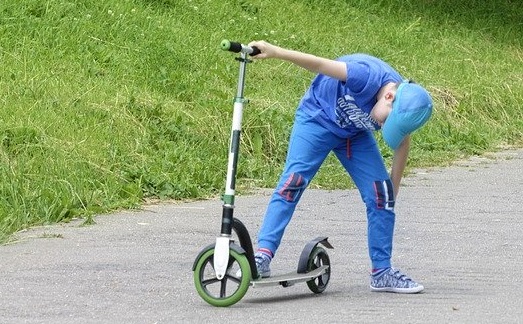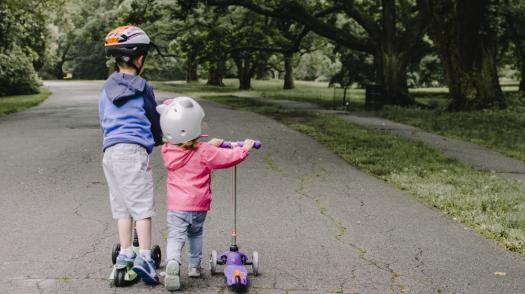
Q&A on legal advice: serious injury
Knowing whether to make a claim after a brain injury can be confusing – law firm Irwin Mitchell’s Sarah Griggs shares her advice for families.
Karen, mum of Liam, shares her experience of rehabilitation after her son’s brain injury and talks about his legal claim using law firm Irwin Mitchell.

Published: 8 September 2020
On 13 February 2019, when Liam was 10, he was playing out with his friends on his scooter when he was hit by a passing vehicle. Liam hit his head badly on the windscreen. Liam’s friend ran to our house to tell me that he had been hit by a car and I rushed over, arriving at the scene only a minute or two after the accident had happened. The police arrived and it was really frightening for us all.
Liam was taken by ambulance to hospital where they carried out an abdominal CT scan and a scan of his elbow and his ankle. He had a large laceration to the back of his head, which was stapled and glued. He was kept in hospital overnight and then discharged the following day. At the time I was very nervous about him being discharged and a few days later Liam was in a lot of pain with his head and this steadily got worse.
I called 111 and they sent an ambulance. The paramedics took one look at him and said he needed to go back to hospital and they arranged a head scan which showed that Liam had a fractured skull and a bleed on the brain. The neurosurgeon who we saw was amazing and showed us the CT scan and where the bleed on the brain was and that it was forming a blood clot. He said that by this point the pressure was reaching the middle part of Liam’s brain. The surgeon told us that he would need to do surgery urgently in the next four hours.
The surgeon carried out a craniotomy and removed the blood clot and put a metal plate in place. There were no complications with the surgery and Liam was discharged from hospital two days later. This was a very difficult time and Liam was very low and emotional. He was desperate to go back to school to be with his friends, and to return to sport as he used to play football and karate three times a week.
Liam was very talented at karate and had competed at both national and club level before his brain injury and used to help to train the younger children. We had been advised by the neurosurgeon that we should wait until May for Liam to resume any sport and this made him very frustrated as he missed a lot of football matches and karate tournaments during this time. He was also very angry with the driver and why the injuries had happened to him.
We began a very gradual phased return to school but Liam was very tired and could only manage a few hours at a time. He had difficulty concentrating as well as frequent headaches and ringing in his ears. He also had to avoid PE and any other sports which really got him down.
Once we had begun to process what had happened, and I could see that Liam was struggling, I decided to contact a solicitor. I was also very cross about the actions of the driver and felt like we needed some support with the police and their investigations.
We instructed Irwin Mitchell to represent Liam in a claim for his serious injuries and Sarah Griggs, Liam’s Solicitor, and Sharon Williams, Irwin Mitchell’s Client Liaison manager, visited me at home. They were both incredibly helpful and supportive and explained the process of the legal claim to me and told me about the therapies that may assist Liam. The team at Irwin Mitchell also introduced Liam and I to the Brain Injury Community Service (BICS) at The Children’s Trust and explained about the support that they could provide for Liam.
Within a few months of the accident, Liam had been allocated a specialist case manager and was assessed by a paediatric neuropsychologist who has been providing support with Liam’s cognitive difficulties and emotional outbursts.
The more time he spent at school, the more obvious it was becoming that Liam was struggling and not functioning at the same ability as he was before his brain injury. BICS at The Children’s Trust have also supported with Occupational Therapy and brain injury education for Liam’s teachers, which has been incredibly helpful.
Looking after Liam’s schooling during lockdown has been a huge challenge and has highlighted his cognitive difficulties more clearly. I couldn’t have coped without the support of the case manager and the therapists at The Children’s Trust. Liam’s case manager has also recently arranged an assessment with an Educational Psychologist who will be on hand when he moves to secondary school in September. It’s daunting to know how Liam will cope with this change, but I’m reassured to know that the therapists and team at the Children’s Trust will also be there to support us with this.
It is early days in terms of Liam’s legal claim and, in the meantime, Irwin Mitchell has been able to secure interim payments to fund Liam’s rehabilitation and they are investigating how much compensation Liam should receive, which involves him being assessed by a number of independent experts who will make recommendations for what Liam needs in the future. This allows me to focus on my priority, which is to give Liam as normal a life as possible.
Liam’s case study was provided by Sarah Griggs in the Serious Injury team at Irwin Mitchell. Liam also received support from The Children’s Trust’s Brain Injury Community Service.

Knowing whether to make a claim after a brain injury can be confusing – law firm Irwin Mitchell’s Sarah Griggs shares her advice for families.

Jem, Dad of Connie, shares his experience of rehabilitation at The Children's Trust and talks about her legal claim.